We Wouldn't Be Too Quick To Buy Chesswood Group Limited (TSE:CHW) Before It Goes Ex-Dividend
Chesswood Group Limited (TSE:CHW) is about to trade ex-dividend in the next four days. The ex-dividend date occurs one day before the record date which is the day on which shareholders need to be on the company's books in order to receive a dividend. The ex-dividend date is of consequence because whenever a stock is bought or sold, the trade takes at least two business day to settle. Therefore, if you purchase Chesswood Group's shares on or after the 29th of November, you won't be eligible to receive the dividend, when it is paid on the 15th of December.
The company's upcoming dividend is CA$0.01 a share, following on from the last 12 months, when the company distributed a total of CA$0.53 per share to shareholders. Based on the last year's worth of payments, Chesswood Group stock has a trailing yield of around 7.5% on the current share price of CA$6.65. Dividends are an important source of income to many shareholders, but the health of the business is crucial to maintaining those dividends. As a result, readers should always check whether Chesswood Group has been able to grow its dividends, or if the dividend might be cut.
Check out our latest analysis for Chesswood Group
If a company pays out more in dividends than it earned, then the dividend might become unsustainable - hardly an ideal situation. Chesswood Group paid out 99% of its earnings, which is more than we're comfortable with, unless there are mitigating circumstances.
Generally, the higher a company's payout ratio, the more the dividend is at risk of being reduced.
Click here to see the company's payout ratio, plus analyst estimates of its future dividends.
Have Earnings And Dividends Been Growing?
When earnings decline, dividend companies become much harder to analyse and own safely. If earnings decline and the company is forced to cut its dividend, investors could watch the value of their investment go up in smoke. With that in mind, we're discomforted by Chesswood Group's 18% per annum decline in earnings in the past five years. When earnings per share fall, the maximum amount of dividends that can be paid also falls.
Another key way to measure a company's dividend prospects is by measuring its historical rate of dividend growth. Chesswood Group's dividend payments per share have declined at 2.7% per year on average over the past 10 years, which is uninspiring. While it's not great that earnings and dividends per share have fallen in recent years, we're encouraged by the fact that management has trimmed the dividend rather than risk over-committing the company in a risky attempt to maintain yields to shareholders.
The Bottom Line
From a dividend perspective, should investors buy or avoid Chesswood Group? Not only are earnings per share shrinking, but Chesswood Group is paying out a disconcertingly high percentage of its profit as dividends. Generally we think dividend investors should avoid businesses in this situation, as high payout ratios and declining earnings can lead to the dividend being cut. All things considered, we're not optimistic about its dividend prospects, and would be inclined to leave it on the shelf for now.
With that being said, if you're still considering Chesswood Group as an investment, you'll find it beneficial to know what risks this stock is facing. Be aware that Chesswood Group is showing 5 warning signs in our investment analysis, and 1 of those is concerning...
Generally, we wouldn't recommend just buying the first dividend stock you see. Here's a curated list of interesting stocks that are strong dividend payers.
Have feedback on this article? Concerned about the content? Get in touch with us directly. Alternatively, email editorial-team (at) simplywallst.com.
This article by Simply Wall St is general in nature. We provide commentary based on historical data and analyst forecasts only using an unbiased methodology and our articles are not intended to be financial advice. It does not constitute a recommendation to buy or sell any stock, and does not take account of your objectives, or your financial situation. We aim to bring you long-term focused analysis driven by fundamental data. Note that our analysis may not factor in the latest price-sensitive company announcements or qualitative material. Simply Wall St has no position in any stocks mentioned.

